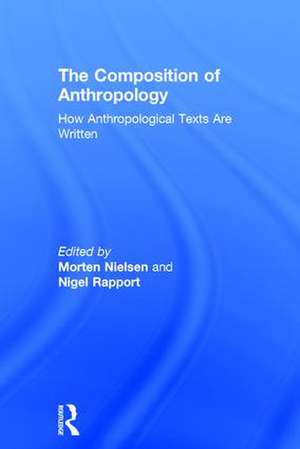The Composition of Anthropology: How Anthropological Texts Are Written
Editat de Morten Nielsen, Nigel Rapporten Limba Engleză Hardback – 20 dec 2017
| Toate formatele și edițiile | Preț | Express |
|---|---|---|
| Paperback (1) | 364.94 lei 6-8 săpt. | |
| Taylor & Francis – 13 dec 2017 | 364.94 lei 6-8 săpt. | |
| Hardback (1) | 1000.27 lei 6-8 săpt. | |
| Taylor & Francis – 20 dec 2017 | 1000.27 lei 6-8 săpt. |
Preț: 1000.27 lei
Preț vechi: 1219.84 lei
-18% Nou
Puncte Express: 1500
Preț estimativ în valută:
191.46€ • 208.04$ • 160.93£
191.46€ • 208.04$ • 160.93£
Carte tipărită la comandă
Livrare economică 21 aprilie-05 mai
Preluare comenzi: 021 569.72.76
Specificații
ISBN-13: 9781138208124
ISBN-10: 1138208124
Pagini: 214
Ilustrații: 8
Dimensiuni: 156 x 234 x 14 mm
Greutate: 0.45 kg
Ediția:1
Editura: Taylor & Francis
Colecția Routledge
Locul publicării:Oxford, United Kingdom
ISBN-10: 1138208124
Pagini: 214
Ilustrații: 8
Dimensiuni: 156 x 234 x 14 mm
Greutate: 0.45 kg
Ediția:1
Editura: Taylor & Francis
Colecția Routledge
Locul publicării:Oxford, United Kingdom
Public țintă
Postgraduate and UndergraduateCuprins
Introduction: On the Genealogy of Writing Anthropology 1. The Life of Concepts and How They Speak to Experience 2. Ten Preludes to a Preface 3. Writing against conclusion 4. Composing texts and the composition of uprisings: Notes on writing the postcolonial political 5. Public Ritual in Mauritius 6. Writing Whalsay: Reflections on how, why, and for who anthropologists write 7. Writing a Cosmopolitan Anthropology in Recognition of Anyone 8. Diversifying from Within: Diaspora writings in Sweden 9. Dialogic Aesthetics: Notes and nodes in analogical software coding 10. Composing American stiob 11. In the Workshop: Anthropology in a Collaborative Zone of Inquiry Epilogue: Writing the Human: Anthropological accounts as generic fragments
Notă biografică
Morten Nielsen is an Associate Professor in the Department of Anthropology at Aarhus University, Denmark.
Nigel Rapport is Professor of Anthropological and Philosophical Studies in the Department of Social Anthropology at the University of St Andrews, UK.
Nigel Rapport is Professor of Anthropological and Philosophical Studies in the Department of Social Anthropology at the University of St Andrews, UK.
Recenzii
"This collected volume is so needed and is such a gift. It is simply a collection of 'making' texts, examining creative practices of 'composition'. This is the space in which the diverse stakes and difficulties of moving from notes to texts can be opened for discussion."
George Marcus, University of California, Irvine, USA
"The Composition of Anthropology is an essential collection that explores the very possibilities and constraints of anthropological writing as a distinct mode of representation. What precisely are the processes through which fieldwork, theoretical concepts, political positions and anthropological experience become translated into text? How do anthropologists communicate knowledge through writing? In addressing these questions the volume is required reading for anyone involved in the writing or analysis of anthropological texts."
Andrew Irving, University of Manchester, UK
"The book is advertised as a methodological tool for students of anthropology as well as a theoretical and practical exploration of creativity for professional readers. For me, it is much more than that. It is a reflection on both the universality and individuality of the writing experience. It shines a light on writing practices that are often personal. It illustrates the unity and diversity of the writing experience as well as the individual but universal nature of humanity itself. There are no conclusions – except to say that the volume has relevance well beyond the field of anthropology. It is a reflective text for all academics who move from their ‘ivory towers’ into the real world and back again to pen their observations. . ." Máiréad Nic Craith, Heriot-Watt University, Edinburgh
George Marcus, University of California, Irvine, USA
"The Composition of Anthropology is an essential collection that explores the very possibilities and constraints of anthropological writing as a distinct mode of representation. What precisely are the processes through which fieldwork, theoretical concepts, political positions and anthropological experience become translated into text? How do anthropologists communicate knowledge through writing? In addressing these questions the volume is required reading for anyone involved in the writing or analysis of anthropological texts."
Andrew Irving, University of Manchester, UK
"The book is advertised as a methodological tool for students of anthropology as well as a theoretical and practical exploration of creativity for professional readers. For me, it is much more than that. It is a reflection on both the universality and individuality of the writing experience. It shines a light on writing practices that are often personal. It illustrates the unity and diversity of the writing experience as well as the individual but universal nature of humanity itself. There are no conclusions – except to say that the volume has relevance well beyond the field of anthropology. It is a reflective text for all academics who move from their ‘ivory towers’ into the real world and back again to pen their observations. . ." Máiréad Nic Craith, Heriot-Watt University, Edinburgh
Descriere
How do anthropologists write their texts? What is the nature of creativity in the discipline of anthropology? This book follows anthropologists into spaces where words, ideas and arguments take shape, exploring the steps in a creative process. In a unique examination of how texts come to be composed, a distinguished group of anthropologists offer valuable insight into their writing habits. These reflexive glimpses into personal creativity reveal not only the processes by which theory and ethnography come to be represented on the page, but also supply examples that students may follow or adapt. Essential reading for all students embarking on enthnographical writing.
